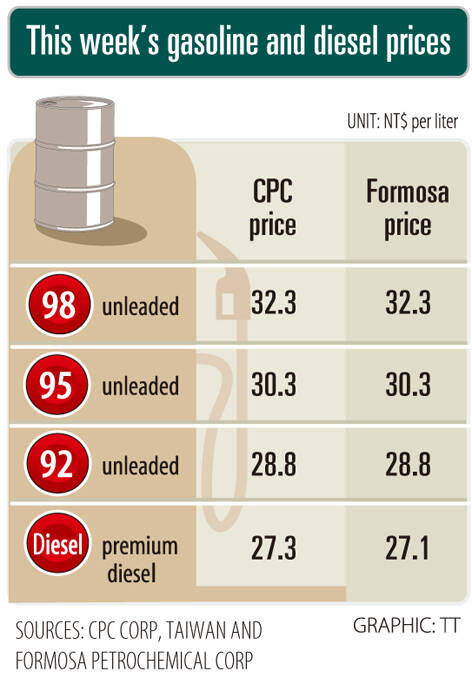The nation’s two major refiners yesterday said they would lower domestic fuel prices for a fourth consecutive week, as international crude oil prices posted the largest weekly decline in more than a year last week.
Domestic gasoline and diesel prices are to drop NT$0.1 per liter this week, CPC Corp, Taiwan (CPC, 台灣中油) and Formosa Petrochemical Corp (台塑石化) said yesterday in separate statements.
Effective today, gasoline prices at CPC and Formosa stations are to decrease to NT$28.8, NT$30.3 and NT$32.3 per liter for 92, 95 and 98-octane unleaded gasoline respectively, the companies said.

Based on CPC’s statistics, 95-octane unleaded accounts for more than 70 percent of its total sales, and its retail price of NT$30.3 per liter this week was the lowest level since the beginning of July last year.
Premium diesel is to cost NT$27.3 per liter at CPC stations and NT$27.1 at Formosa pumps, the companies said.
International oil prices fell last week as Israel said it would not strike Iran’s oil facilities, easing fears of supply disruption, and the International Energy Agency’s lowering of its global crude oil demand forecast for this year, the companies said
Recent data from China showing that oil demand fell from a year earlier also weighed on market sentiment, with CPC’s cost of crude oil down 3.83 percent last week from a week earlier based on its floating oil price formula.
Front-month US West Texas Intermediate crude oil futures fell 2.05 percent to settle at US$69.22 per barrel on Friday, down 8.39 percent in the week — the largest weekly decline since the week ending on Oct. 6 last year, while Brent crude oil futures fell 1.87 percent to US$73.06 per barrel on Friday, declining 7.57 percent for the week — the biggest weekly drop since the Sept. 6 week, Dow Jones Newswires reported on Saturday.

Intel Corp chief executive officer Lip-Bu Tan (陳立武) is expected to meet with Taiwanese suppliers next month in conjunction with the opening of the Computex Taipei trade show, supply chain sources said on Monday. The visit, the first for Tan to Taiwan since assuming his new post last month, would be aimed at enhancing Intel’s ties with suppliers in Taiwan as he attempts to help turn around the struggling US chipmaker, the sources said. Tan is to hold a banquet to celebrate Intel’s 40-year presence in Taiwan before Computex opens on May 20 and invite dozens of Taiwanese suppliers to exchange views

Application-specific integrated circuit designer Faraday Technology Corp (智原) yesterday said that although revenue this quarter would decline 30 percent from last quarter, it retained its full-year forecast of revenue growth of 100 percent. The company attributed the quarterly drop to a slowdown in customers’ production of chips using Faraday’s advanced packaging technology. The company is still confident about its revenue growth this year, given its strong “design-win” — or the projects it won to help customers design their chips, Faraday president Steve Wang (王國雍) told an online earnings conference. “The design-win this year is better than we expected. We believe we will win

Chizuko Kimura has become the first female sushi chef in the world to win a Michelin star, fulfilling a promise she made to her dying husband to continue his legacy. The 54-year-old Japanese chef regained the Michelin star her late husband, Shunei Kimura, won three years ago for their Sushi Shunei restaurant in Paris. For Shunei Kimura, the star was a dream come true. However, the joy was short-lived. He died from cancer just three months later in June 2022. He was 65. The following year, the restaurant in the heart of Montmartre lost its star rating. Chizuko Kimura insisted that the new star is still down

While China’s leaders use their economic and political might to fight US President Donald Trump’s trade war “to the end,” its army of social media soldiers are embarking on a more humorous campaign online. Trump’s tariff blitz has seen Washington and Beijing impose eye-watering duties on imports from the other, fanning a standoff between the economic superpowers that has sparked global recession fears and sent markets into a tailspin. Trump says his policy is a response to years of being “ripped off” by other countries and aims to bring manufacturing to the US, forcing companies to employ US workers. However, China’s online warriors